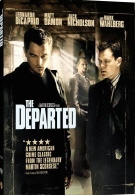It's sometimes easy to forget that Martin Scorsese doesn't solely make movies about gangsters. In fact, it would be more appropriate to say that over the course of his career Scorsese has only occasionally made a gangster movie. Of the 21 major movies he's directed since 1972, only four, Mean Streets, Goodfellas, Casino, and the recent The Departed, are about modern organized crime. But, as The Departed demonstrates, he does this type of movie very, very well. After directing two movies in the early 1990's featuring the Italian mob starring Robert De Niro and Joe Pesci and written by Nicolas Pileggi, Martin Scorsese turned away from gangsters and towards music, documentaries, and Leonardo DiCaprio. The Departed changes Scorsese's usual crime milieu, Italian-American mobsters, to the Irish mob in South Boston ("Southie"). Working from a script that Southie-raised William Monahan (Kingdom of Heaven, Jurassic Park IV based on the Hong Kong movie Infernal Affairs, Scorsese brings many of the same cinematic tricks to this movie that he used in his previous mafia stories. In fact, except for the accents and the locations, the movie could be transported to Little Italy with almost no change.
The story is anchored by the performances of Leonard DiCaprio (Billy Costigan) and Matt Damon (Colin Sullivan), who are both pretending to be something they are not. Costigan is a Massachusetts State Police trainee who has infiltrated the gang run by Frank Costello (Jack Nicholson in a role based on real "Southie" scum-bag Whitey Bulger). The fear and uncertainty he carries at being found-out is palpable and DiCaprio turns in a stellar performance. Sullivan is a Statie Detective, placed on the force by Costello to feed him information on police activities, which Sullivan does with increasing unease about his role. He doesn't walk around sweating and popping pills like Costigan, but the pressure of possibly being in over-his-head is clear on Damon's face.
Eventually, both "moles" realize that they have a counterpart and begin to hunt for each other while trying to avoid detection. Nicholson chews every piece of scenery he sees and, while his ability to control both Damon and DiCaprio feels very realistic, he's hard to buy as an Irish mob boss. His accent comes and goes and he's a bit over-the-top even in an over-the-top role. Ray Winstone as his number two man, Mr. French, would have been a better top guy; his performance is excellent. All the supporting performances are top notch, from Mark Wahlberg in an surprising Oscar-nominated turn as foul mouthed intelligence cop Sgt. Dignam, Alec Baldwin as Damon's dryly humorous boss, Ellerby, and even Martin Sheen, channeling RFK's accent as the State Police Captain in charge, Queenan. Scorsese's ability to get powerful, humorous, realistic performances out of this stellar cast is one reason that this movie works so well.
The performances are the strength of the movie, combined with the plot that keeps you riding a fine line on what will happen and highlights the stress that DiCaprio and Damon feel in leading their double-lives. One weakness is the relationship that, coincidently, both men have with police shrink Madolyn, played by relative unknown Vera Farmiga. The fact that both men are involved with the same woman comes off as forced, but beyond that, Farmiga is involved in many key scenes where Damon and DiCaprio reveal what internal parts of themselves they can, and she doesn't quite seem up to their level. Not enough to sink the scenes, but just a small drawback in an otherwise fine set of supporting performances.
The cat and mouse game played by the two leads under the eye of Nicholson and using cell phones as a key plot point is masterful and, in Scorsese's assured hands, scenes pop off the screen with tension. He also uses classic rock songs in his trademark manner, impressively setting time, place, or mood. However, his use of "I'm Shipping Up To Boston" a ferocious song by the celtic punk band The Dropkick Murphys during the title card sequence (following an 18 minute prologue) really kicks the movie into high gear and is a brilliant choice. That said, there are some camera tricks that feel just like that, tricks. No real purpose for the fast pan across Wahlberg's face or the pinpoint shot of Damon in front of police headquarters. Also, as has been mentioned in other reviews, the ending ten minutes doesn't exactly work. It is very much a "wow, I didn't see that coming" moment, but not exactly in a good way. It feels like a cheat.
About every five to ten years, Scorsese hauls out the guns, profanity, and voiceovers and looks at a group of men who live by their own rules. It always works. Sometimes it's a long-term classic and The Departed has that chance, although it will probably be eclipsed by Goodfellas when Scorsese's great gangster film is discussed. It looks like he will finally win a Best Director Oscar for his work this year, which will put him in league with Henry Fonda and others. Not winning for their best work, but winning for work that is pretty good just the same. This two-disc collectors edition demonstrates the old adage "it's quality not quantity that counts." There is no commentary track and, besides a trailer on disc 1 with the movie, there are only four extras listed on disc 2. I think I've stated my opinion on the lack of commentary tacks. I understand that there may be personal creative reasons why some directors, notably Scorsese, Woody Allen, Steven Spielberg and others, don't do commentary tracks, but I really wish they'd allow cast members or other creative people involved to record their thoughts and observations. A lot of today's commentaries can be pretty dry and uninformative, but sometimes it does add insight and is one of the reasons that DVD's can remain a superior form to downloading and other sources of home viewing.
Although there are only four extras listed, they are a substantial group and do provide some additional insight to the film and Scorsese, so they are a must for any fan. There is no true "making-of" featurette, but in discussing the source material, Scorsese's influences, and Scorsese's filmmaking history, the extras provide a good understanding of how the film came out like it did. Scorsese really dominates the extras, so anyone hoping for a look at DiCaprio, Nicholson, Damon or the other big name cast members, will be disappointed. They show up only in brief interview snatches. It's Marty's show the whole way.
Your Daily Blend of Entertainment News
"Scorsese on Scorsese" is a career spanning retrospective of all his major releases, commented on by himself and no one else. No actors, critics, or peers give insight into the great director, every word is his own. The hour and a half documentary originally aired on the Turner Classic Movies in 2004, around the time of the release of The Aviator. After briefly discussing his childhood and family, Scorsese covers almost his entire major film catalogue in chronological order. He is, obviously, well spoken and discusses what he was trying to do with each film, including the little seen or appreciated Kundun, the controversial The Last Temptation of Christ, and the often underappreciated The King of Comedy. His discussion of that film is particularly interesting as he refers to the subject matter as "unpleasant" about five or six times. It's a must-see for any Scorsese fan, unless you've already seen it on TCM.
The other two featurettes deal a little more directly with The Departed, although not completely so. There is a twenty minute overview of Whitey Bulger, the basis for Jack Nicholson's character in the film. Reporters, cops, and former "associates" all discuss this man as the leader of the criminal underworld in South Boston for many years. Currently the number two man on the FBI's most wanted list (after Osama himself), Bulger is universally described as a heartless, selfish, murdering, ruthless ruler. One man notes that if he was seen helping an old woman across the street it was because she had an attractive granddaughter. The connection to the actual movie is only a brief part of the dialogue, with most of it focusing on Bulger and his associates. Very well done and interesting to the background of what is sometimes glamorized by Scorsese.
The second featurette is called "Crossing Criminal Cultures." This primarily features Scorsese or movie critic Peter Travers discussing early crime films like Scarface, White Heat, Angels with Dirty Faces, and Little Caesar. There is an attempt to tie the early works to The Departed and Scorsese's other crime films, but most of it is just demonstrating Marty's appreciation for those early films. It comes off a bit like a commercial for picking the classics up on DVD.
Finally, there are about ten deleted scenes included, with the introduction of each one by Scorsese. The entire segment, including the introductions only lasts 25 minutes, so it should be clear that these are mostly not very substantial scenes. The introductions sometimes last longer than the scene itself.
This is a beautiful film to watch and the transfer is impressive. Even when he seems to be overplaying, Scorsese has a strong visual style that is well served by the violent material. The uncluttered handling of the extras also makes everything very easy to navigate. The deleted scenes are simply shown in a large group, without even the option of going to each one individually. The entire set is done with a classy, professional presentation that gives you everything you need (except for the commentary) and nothing you don't.

